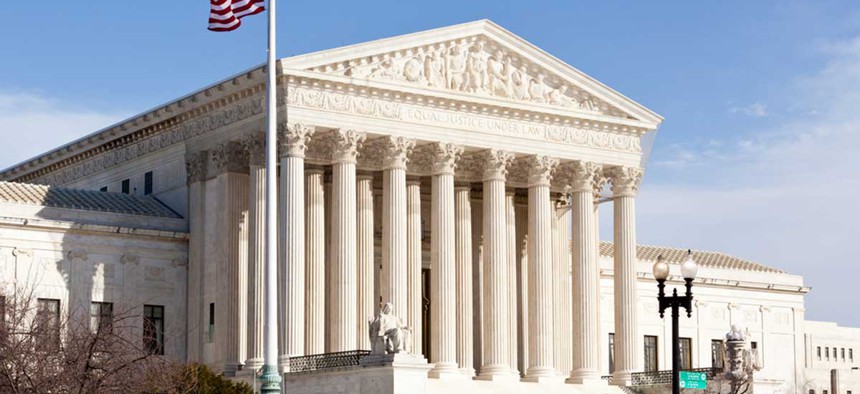
Steve Heap/Shutterstock.com
A Divided Supreme Court Hands Public-Sector Unions a Win
The justices split 4-4 in Friedrichs v. CTA, leaving a pro-union ruling in the lower courts intact.
The U.S. Supreme Court split 4-4 in Friedrichs v. CTA on Tuesday, thwarting a legal challenge that labor activists feared would deal a crippling blow to public-sector unions throughout the country.
“The judgment is affirmed by an equally divided Court,” the justices wrote in a brief, unsigned ruling.
The case was closely watched not only because of the implications for organized labor, but also how the court would rule following Justice Antonin Scalia’s death on February 13. Scalia was seen as likely to have ruled against the unions, and his death deprived the court’s conservatives of a tie-breaking fifth vote.
Tuesday’s deadlock means that the Ninth Circuit’s ruling in favor of the teachers’ union will stand. But it also signaled that Justice Anthony Kennedy, who almost certainly joined Chief Justice John Roberts and Justices Samuel Alito and Clarence Thomas on one side of the split, would be willing to overrule Abood v. Detroit Board of Education, the decision that became the basis for public-employee contracts. That tosses the precedent’s ultimate fate to the next justice who serves on the Court.
Rebecca Friedrichs and nine other California teachers who brought the suit argued the state’s agency-fee system forced them to subsidize political activities they didn’t support in violation of the First Amendment. Under California labor law, public employees—teachers, police officers, firefighters, and so forth—vote to designate a union as their exclusive representative for collective-bargaining purposes. These employees can’t be forced to join a union, but many of them do. Those who do join pay dues to support the union’s activities, which range from collective bargaining itself to broader political advocacy.
Those who don’t join are still required to pay a smaller “agency fee,” also known as a fair-share fee, to the union to help fund its collective-bargaining functions. Unlike member dues, funds from the agency fees can’t be used for the union’s political purposes. The lesser fee helps avoid a free-rider problem where employees benefit from the union’s representation without paying to support it. Twenty-two other states and the District of Columbia have similar labor laws on the books.
The Supreme Court upheld agency fees in the 1977 decision in Abood and, theoretically, that would have been the end of Friedrichs. The Ninth Circuit Court of Appeals ruled for the teachers’ union with a two-page opinion, describing the teachers’ case as “so insubstantial as to not require further argument.”
But a majority of justices indicated in 2014 they could be willing to overturn it, and granted certiorari to the Friedrichs plaintiffs when the case reached the Court. In Harris v. Quinn, a 5-4 case that struck down fair-share fees for home-health care providers in Illinois, the majority laid siege to Abood at length. Justice Samuel Alito and the other four conservatives criticized the 1977 case for purportedly misunderstanding the previous cases it cited as precedent, for failing to understand the differences between public- and private-sector unions, for practical administrative problems, for burdening public employees who don’t join a union, for shoddy statistical analysis, and for other perceived sins.
“The Abood Court’s analysis is questionable on several grounds,” Alito wrote for the Court. “Some of these were noted or apparent at or before the time of the decision, but several have become more evident and troubling in the years since then.” He and the other justices declined to overrule Abood, however, arguing instead that it didn’t apply in Harris at all.
The message was clear nonetheless. “Readers of today’s decision will know thatAbood does not rank on the majority’s top-ten list of favorite precedents—and that the majority could not restrain itself from saying (and saying and saying) so,” Justice Elena Kagan replied in dissent. “Yet they will also know that the majority could not, even after receiving full-dress briefing and argument, come up with reasons anywhere near sufficient to reverse the decision.”
During oral arguments in Friedrichs, the court’s five conservative judges seemed poised to overturn Abood. The teachers made the expansive claim that all public-sector union activities, even negotiating health benefits and pay raises, are inherently political. Scalia seemed to embrace this point at oral arguments. “The problem is that everything that is collectively bargained with the government is within the political sphere, almost by definition,” he told the advocates.
A decision that struck down agency fees would not deal a fatal blow to American organized labor, but it would leave a grievous wound. As my colleague Alana Semuels noted in January, states that ended the agency-fee system through legislative action saw declines in union membership, including former labor strongholds like Michigan and Wisconsin. More than one-third of U.S. public-sector employees belong to a union.







